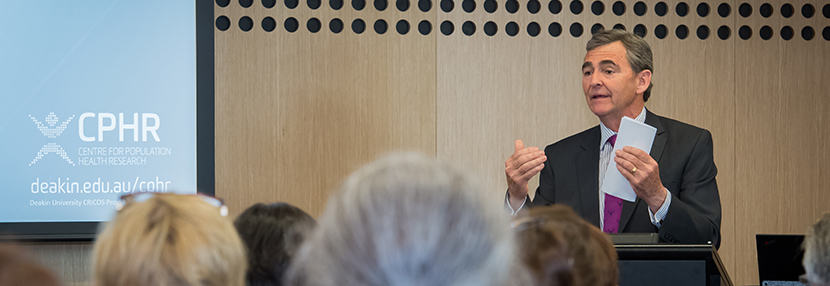The world’s first WHO Collaborating Centre for Health Literacy has been launched.
Deakin University has launched the WHO Collaborating Centre for Health Literacy – its second World Health Organisation (WHO) Collaborating Centre. It joins the WHO Collaborating Centre for Obesity Prevention – also located within Deakin’s Centre for Population Health Research.
Professor Richard Osborne, Director of the new Centre, and his team at Deakin have pioneered new, highly effective approaches to health literacy over the past decade – establishing programs in over 20 countries that are improving health outcomes for some of the world’s most disadvantaged people.
His Ophelia health literacy program has influenced health outcomes in Australia and abroad since it was launched in August 2013 with the Victorian Department of Health and Human Services, Monash University and sites across Victoria.
“I began to look at health literacy in the mid-2000s and discovered the health sector faced huge challenges,” he said at the Centre’s official launch at Deakin Downtown.
“We tried to find ways to measure health literacy, but discovered the evidence-base wasn’t there. We realised that if you can’t measure its effects, you can’t manage it. So then we began to work with organisations such as WHO to co-design solutions and build practical resources that could really make a difference.”
The Centre’s four-year plan has been designed to align with the sustainable development goals of the United Nation’s “2030 Agenda.”
Speaking at the launch, Deakin Vice-Chancellor Professor Jane den Hollander AO said Deakin was passionate about improving health literacy for everyone.
“Now the real hard work starts. We have four years to deliver on our promise to help achieve the goals of the UN’s 2030 agenda of sustainable development to leave no one behind,” Professor den Hollander said.
“One important goal of the Centre is to develop a community-level health measurement tool that is practical and understandable. It is an important opportunity for us to contribute to the global health agenda.”
The Hon John Brumby AO welcomes Deakin University to the Global Health Alliance Melbourne
The WHO CC is hosted by the Department for the Prevention of Noncommunicable Diseases at the World Health Organization in Geneva. Department Director, Dr Douglas Bettcher, said: “Critical health literacy not only empowers individuals to make informed choices – it also enables them to engage effectively in processes that impact on their health and the health of their loved ones.”
The WHO Collaborating Centre for Health Literacy was officially launched by Professor Vivian Lin, Director, Health Sector Development, of WHO’s Western Pacific Regional Office. Speaking at the launch, Professor Lin described the evolution of health literacy since the 1986 UN Ottawa Charter for Health Promotion, where there was a much more narrow approach to health literacy, such as ensuring prescription instructions were understandable to an eighth grader.
In contrast, the 2016 Shanghai Declaration recognises that health literacy is central to improving health outcomes. “Health is co-produced. Co-design is a very important part of achieving better outcomes,” Professor Lin said.
“We know that people have to take control of their own health. Health literacy is not just about health, but encapsulates all issues that affect well-being, including other issues such as SARS, non-communicable diseases or climate change. Also, it is about the demand side, not just the supply side. Health literacy is a central part of the 2030 Agenda for Universal Health.”
It was also announced at the launch that Deakin has joined the Global Health Alliance Melbourne. The Hon John Brumby AO, Alliance Chair, officially welcomed Deakin to the group, which aims to improve global health equity, outcomes and broader issues of health security. The Alliance marks the first time that top global entities, such as WHO, along with universities, the private sector, NGOs and other bodies, have joined with the State Government with a common goal – to establish Melbourne as the pre-eminent global health hub for the southern hemisphere.
- For more information, contact Professor Richard Osborne, Director, Health Systems Improvement Unit, a WHO Collaboration Centre for Health Literacy.
Speakers and invited guests at the launch of the WHO Collaborating Centre for Health Literacy
Main photograph: Deakin Vice-Chancellor Professor Jane den Hollander AO, the Hon John Brumby AO, Professor Vivian Lin and Professor Richard Osborne
Published by Deakin Research on 24 October 2017





